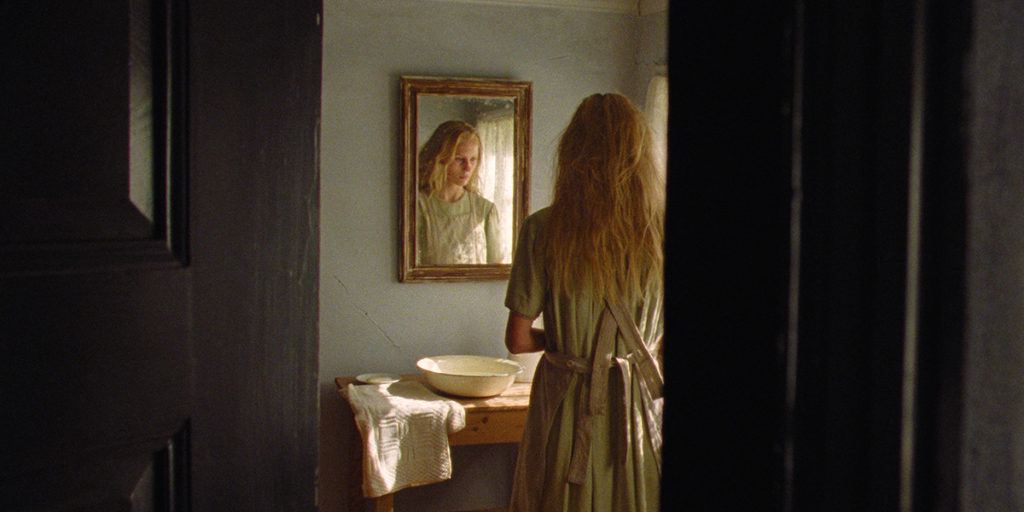As In Heaven (Du som er i himlen)

Flora Ofelia Hofmann Lindahl as Lise in Tea Lindeburg's AS IN HEAVEN. Image courtesy TIFF.
Every waking moment of a woman’s life, we’re taught to keep tally of our worth by a limited set of metrics that seem inescapable: physical desirability, social malleability, non-threatening obedience. Tea Lindeburg’s directorial debut, AS IN HEAVEN (Du som er i himlen) is an adaptation of Marie Bregendahl’s 1912 novel, En Dødsnat. More than a century later, on the heels of Texas’ passage of legislation that decrees forced birth, it’s clear that constant vigilance maintains the slow progress of social equality. Even a moment of complacency will slip us back into a cycle of existence wholly conditional on willing fecundity.
Fourteen-year old Lise (Flora Ofelia Hofmann Lindahl) wakes one morning to a violent premonition of a fast-approaching storm raining blood. She’s the eldest of a seemingly countless number of siblings (before the advent of the industrial revolution, a rural homestead required as many free laborers as could be conceived), and the apple of her forward-thinking –and heavily pregnant– mother Anna’s (Ida Cæcilie Rasmussen) eye. Lise’s life is on the precipice of change; she’s being sent to school in lieu of immediate marriage to a neighboring farmer. Remote and sour-faced, her father (Thure Lindhardt) admonishes Lise for her juvenile, disarrayed appearance. Never mind that she’s yet a child. Observant, empathetic, and with a fierce sense of right and wrong, Lise navigates life on her family’s homestead, Broholm, with an acute awareness of others. Hers is a defense mechanism that most women must develop early to survive.
Lise recognizes the fury burning inside neighboring laborer’s son, Kristian (Emil Hornemann Juel), abandoned by his family at an empty homestead, awaiting the next owner’s arrival. Emaciated and scared, he lashes out at Lise, envious of her mother’s love. It’s a lesson she takes to heart; resentful boys turn into resentful men who punish you for your happiness. Lise mollifies him with a quick glimpse of nudity in exchange for the precious hairpiece that he’d held hostage. It’s a transaction requiring a fragment of her dignity as payment for something which she had an inherent right to, but was denied.
Lise recognizes in Jens Peter (Albert Rudbeck Lindhardt), also taken in after abandonment, a kindness imparted upon him by Anna. Well-nourished, gentle, and thoughtful, Jens doesn’t speak down to Lise. They dance around each other with the clumsiness of an adolescent crush. She again loses the hairpiece, but this time in entirely different circumstances; it falls into a pile of hay as they roughhouse with awkward awareness of each others’ gangly limbs. Upon noticing its absence, Lise runs back to the stable in a panic. The pewter clip is precious because it’s her mother’s. She’s interrupted by a stomach-turning scream; Anna has gone into labor.
AS IN HEAVEN shows us the cruel and nonsensical realm of adults through the eyes of children as they observe the world’s madness with unique clarity. Each moment on the homestead that Lise navigates in the presence of her siblings and cousins becomes more fraught with awareness of her mother’s mortality and how her life is in the hands of those inflicted by the single-minded ignorance of religious superstition. The housekeeper, Old Sine (Kirsten Olesen), puts more faith in prayers and portents from God than medicine. Lise keeps her own blood-drenched dream a secret from her grandmother—who buried ten of her fourteen children—because she’s already placed her faith in a premonition: Anna will give birth to a son; if they call the local doctor, she will die.
Lindeburg gives the characters space to breathe while also employing claustrophobic framing in carefully chosen instances, ramping up the audience’s anxiety as they see Lise’s slow realization that her world is crumbling beneath her feet. She’ll soon be swallowed whole, her entire future determined for her, any hope of education or escape quickly eroding. The experience is tense and terrifying; the expression of pure visceral terror on Lise’s face as she watches her mother descend into madness, all higher order reasoning consumed by her limbic system’s response to unimaginable pain, is impossible to shake. It’s a moment that captures humanity’s primal fears as adeptly as any horror movie, fully capitalizing on Hofmann Lindahl’s talent. Lise’s angst is textured and real, existing deeper than her gaunt face and haunted eyes. The film’s final scene is perfect in its simple, yet acute, visual observation. It tells a thousand stories with a perfectly pressed dress, an immaculately fixed barrette, and a face that’s aged ten years almost overnight.